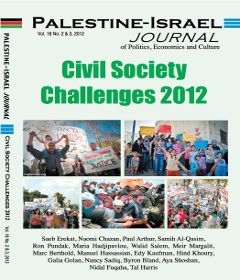The Israeli civil society and the Palestinian civil society are in an evolutionary process of construction. Yet it is clear that there are two totally different realities, and therefore, the focus on each side is quite different. Israeli civil society is composed of over 30,000 organizations that deal with a wide range of topics. The Palestinians also have thousands of organizations that deal with all aspects of life. Therefore, when we approach the challenges facing civil society, we focus on those elements of society which directly relate to the political process and the conflict between the parties. On the Israeli side, this issue of the PIJ highlights topics such as the threat to democracy in Israel and attempts to place limits on nonprofit organizations, particularly on human rights and peace organizations and their ability to influence the peace process. As for the Palestinians, we must remember that civil society was influenced dramatically by the establishment of the Palestinian Authority (PA) in 1994. Until that time civil society organizations were dominant, functioning as an alternative to the occupation, enabling Palestinian self-determination, though with very significant political ties. In 1994 the PA inherited many of the functions of civil society organizations. Thus, articles focus on the, relations between the PA and civil society organizations post Oslo agreement and the political connections of Palestinians organizations.
Peace-building activities that help the process of peace and reconciliation between the Israeli and Palestinian peoples, and certainly activities based on the common goal of ending the occupation and realizing two states for two peoples, not only must continue and overcome, but also must receive support from all those who believe in similar political approach. A Peace process comes from two parallel efforts that feed on each other: on the one hand, a top-down process, which is directly connected to government policy, and civil society can and should influence the decision-making process at this level; on the other hand, a bottom-up process, which comes from the ranks of civil society and creates a cohesiveness of process and the relationships which will develop in the future. Finally, an attempt was made to explore the subject from the perspectives of other countries and societies which have had processes similar to ours, such as Ireland, Cyprus, South Africa and the United States, to learn from the experience of others.

